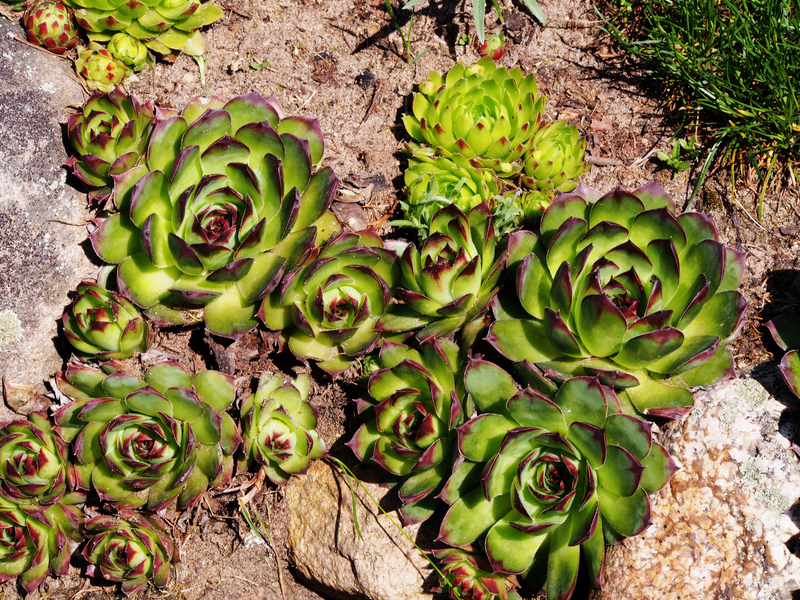Tranquil Harmony: Explore Zen Garden Ideas for a Calm Space
Posted on 26/06/2025
Tranquil Harmony: Explore Zen Garden Ideas for a Calm Space
Are you craving a serene retreat right in your own backyard? Discover the transformative power of zen garden ideas for cultivating a calm space. Bringing a touch of tranquil harmony to your environment not only elevates aesthetics, but can have a profound effect on mental wellbeing. Dive into our comprehensive guide and unlock the secrets behind creating an oasis of peace in any outdoor (or even indoor) space.
What is a Zen Garden?
A Zen garden, or "karesansui," originated in Japan during the Muromachi period as a meditative aid for Buddhist monks. It consists mainly of rocks, gravel, sand, moss, and minimalistic plants rather than abundant flowers and lush foliage. The main focus is to reflect nature's essence in a reduced, symbolic way that fosters mindfulness, clarity, and inner peace. Today, Zen garden design is cherished worldwide for its simplicity, elegance, and capacity to nurture a sense of calm.

Benefits of Creating a Zen Garden Space
- Stress Relief: The mindful process of arranging stones and raking sand soothes the mind and body.
- Enhances Mindfulness: Encourages living in the moment through meditative gardening practices.
- Low Maintenance: Unlike traditional gardens, Zen gardens require minimal watering and care.
- Increases Aesthetic Appeal: Instantly elevates your outdoor (or indoor) space with elegant, deliberate design.
- Improves Focus: Offers a dedicated place for reflection, meditation, or simply unwinding after a long day.
Incorporating calm garden spaces inspired by Zen philosophy can truly help carve out moments of peace amidst hectic routines. Let's delve into the essential elements and innovative ideas that will guide you in creating your own harmonious sanctuary.
Essential Elements of a Zen Garden
1. Gravel and Sand
The most iconic feature of Zen gardens is their raked gravel or sand beds. Representing water or the ocean, the carefully drawn patterns symbolize waves, currents, and ripples. This element inspires meditation and visual calmness.
2. Rocks and Stones
Stones, arranged in purposeful clusters or individually, stand for islands, mountains, or animals. The asymmetrical placement fosters balance and stability, echoing the principles of tranquil harmony.
- Choose natural, weathered stones for authenticity.
- Position rocks in odd-numbered groupings to guide the eye naturally.
3. Moss and Minimalist Plants
A touch of greenery enhances the tranquil atmosphere without overwhelming the senses. Moss grows naturally in shaded, moist conditions but can be cultivated for effect. A few selected plants, such as bamboo, Japanese maple, or fern, add dynamic softness.
4. Water Features
Not all Zen gardens include water, but a small pond, trickling fountain, or stone basin can enhance the sense of serenity. Even the sound of gentle flowing water amplifies the experience of calm garden spaces.
5. Bridges, Paths, and Stepping Stones
Create pathways using irregular stepping stones or wooden planks. These gentle curves and soft lines encourage a slow, reflective walk--perfect for a peaceful harmony garden.
6. Structures and Accents
Add a touch of Japanese tradition with lanterns, bonsai containers, bamboo fences, or a simple bench. These accents, when used sparingly, can become focal points within your serene zen space.
Top Zen Garden Ideas for Your Calm Space
1. Mini Zen Gardens
Limited space? Craft a desktop zen garden in a shallow tray with fine sand, small stones, and a tiny rake. Perfect for the office or meditation corner, the act of raking daily will nurture inner tranquility and mindfulness.
- Use a compact rectangular or circular tray.
- Incorporate a single candle or figurine for symbolism.
- Change stone arrangements or sand patterns according to your mood or intention.
2. Courtyard Zen Gardens
Transform an unused patio or courtyard into a tranquil harmony garden with raked gravel, standing rocks, and minimalist furniture. Enclose the area with bamboo screens or low hedges for privacy and a cocooning effect.
- Position a small water bowl or fountain as a central feature.
- Add container-grown bamboo for vertical interest.
- Use natural wood or stone for seating and boundaries.
3. Shaded Moss Gardens
For areas with dappled light or persistent shade, focus on a lush moss carpet interspersed with large flat stones. The velvety texture and muted hues instantly evoke serenity and are low-maintenance.
- Encourage moss with gentle watering and minimal foot traffic.
- Mix Japanese shade plants for seasonal interest.
4. Water-Centric Zen Spaces
Incorporate a reflecting pond, stone basin (tsukubai), or bamboo water spout (shishi-odoshi) to highlight the harmonious relationship between water and stillness. The play of light on water's surface adds a mesmerizing, meditative quality.
- Surround water features with smooth river stones and ferns.
- Install a bench or meditation spot nearby, oriented toward the water.
5. Rock and Gravel Meditation Zones
Dedicate a part of your landscape exclusively to raked patterns and sculptural rocks. This minimalist approach is perfect for practicing focus while drawing swirling or linear designs in the gravel, enveloped by silence.
- Change raked designs according to mood or season.
- Introduce wind chimes or bamboo accents for subtle sensory layers.
6. Bamboo & Minimalist Plant Borders
Frame your Zen garden with clumping bamboo, ornamental grasses, or pruned hedges. This not only delineates your calm space but provides a living "wall" that muffles noise and enhances privacy.
- Choose non-invasive bamboo species.
- Stagger heights for a layered look that softens the overall garden.
7. Pathways to Peace
Create winding, uneven garden paths using flagstones, river stones, or decomposed granite. Each step through the garden is an invitation to slow down, appreciate, and reconnect with nature's rhythms.
Tips for Designing Your Zen Garden
- Start Small: It's easy to expand later as your vision and experience grow.
- Embrace Simplicity: Less is more. Avoid clutter and overplanting.
- Balance the Elements: Achieve harmony by combining stones, sand, plants, and water in thoughtful proportion.
- Observe Nature: Take inspiration from natural landscapes, such as riverbanks, mountains, and quiet forests.
- Personalize: Infuse spiritual symbols, favorite stones, or calming accents to make the space your own.
- Steer Clear of Bright Colors: Stick to earthy neutrals and soft greens for a restful palette.
The Ritual of Care: How to Maintain Your Zen Garden
Part of the beauty of Zen gardens lies in their low-maintenance design. Yet, caring for your calm space can be a meditative ritual in itself:
- Rake gravel and sand regularly to keep patterns crisp and the surface refreshed.
- Remove fallen leaves or debris to maintain a pure, uncluttered look.
- Prune moss, bamboo, or ornamental grasses to their proper forms.
- Monitor any water features for algae and replenish as needed.
- Refresh stones and reset materials seasonally to keep the space feeling new and inspiring.
This ongoing attentive care fosters deeper calm and attentiveness--echoing the spirit of Zen itself.
Best Plants for Zen Garden Harmony
While plants are used sparingly in zen-inspired gardens, their placement is quite purposeful. Consider these popular choices:
- Moss: Ideal for carpets of green in shady spots.
- Bamboo: Adds structure, sound, and privacy.
- Japanese Maple: Offers rich fall color and delicate foliage.
- Ferns: Perfect for softening edges and moist areas.
- Azaleas and Camellias: Provide subtle blooms and evergreen structure.
- Ornamental Grasses: Movement and texture through the seasons.
Remember, restraint is key. Let the rocks, sand, and space between elements communicate the garden's spirit.
Zen Garden Ideas for Indoors
Don't have a yard? Indoor zen gardens can be equally effective for fostering tranquility. Use tabletop trays, glass containers, or terrariums. Arrange miniature rocks, sand, and tiny bonsai for a portable peaceful haven.
- Place in a meditation nook, bedroom, or office desk for daily inspiration.
- Refresh with incense, candles, or gentle LED lighting.
Inspiring Zen Garden Styles to Explore
Karesansui (Dry Landscape Garden)
Focuses on raked gravel and stone symbolism. Ideal for small or minimal spaces where water is absent but implied through design.
Chaniwa (Tea Garden)
Designed for the Japanese tea ceremony, these gardens feature stepping-stone paths, lanterns, and a rustic well or basin. Easily adapted for a shaded corner or as an entry garden for your home.
Tsuboniwa (Courtyard Garden)
Created in small courtyards, often in urban settings, these gardens blend stone, moss, and a simple water feature to deliver maximum calm in the minimum footprint.
Roji (Dewy Path Garden)
A garden path garden, focusing on the journey as much as the destination. Winding steps, interspersed with stone lanterns, arch through greenery and punctuation stones, leading visitors into new states of mind.
Finding Your Own Tranquil Harmony
Implementing Zen garden ideas is more than a landscaping trend; it's a mindful practice that brings peace, clarity, and natural beauty into your daily environment. Whether you begin with a mini desktop garden or transform an entire backyard, the rewards ripple through every aspect of life.
- Regain focus and creativity with your own harmony garden.
- Reconnect with nature and your breath, one zen space at a time.
- Create a unique, ongoing ritual of care and observation.
Begin your journey toward tranquil harmony--explore, imagine, and build your ideal calm space inspired by timeless zen garden design.

FAQs About Zen Gardens and Calm Spaces
- Can anyone create a Zen garden, regardless of experience?
Absolutely! Zen gardens are simple by design, making them accessible to both beginners and seasoned gardeners alike. - How much space do I need for a zen-inspired garden?
You can start with a small tray or devote an entire yard--the principles work at every scale. - What is the best location for a calm space garden?
Select a spot away from noisy distractions, ideally visible from inside the home and nestled in partial shade. - Do Zen gardens require a lot of maintenance?
No, the minimalist approach keeps upkeep low, mostly focusing on raking sand/gravel and occasional pruning. - Can Zen gardens really help with stress?
Research and firsthand accounts agree--spending time in tranquil, harmonious environments encourages relaxation and mindfulness.
Conclusion: Embrace Tranquil Harmony in Your Own Zen Garden
The journey to inner peace starts at home--with purposeful design, humble materials, and mindful attention, you can create a sanctuary that embodies tranquil harmony. Explore the world of Zen garden ideas. Whether in a backyard or a desktop tray, a calm space is within reach--an everlasting source of serenity, clarity, and balance in our often chaotic world.
Ready to start your journey? Embrace the simplicity and beauty of a Zen garden today and transform any space into a peaceful retreat full of tranquil harmony.
Latest Posts
Perfect Gardening Gadgets for Outdoor Enthusiasts
Harmonize Garden Beauty and Comfort with Exceptional Seating
Herbs, Vegetables, and More: Your Container Gardening Toolkit
Transform ordinary backyard into an extraordinary kid's garden

